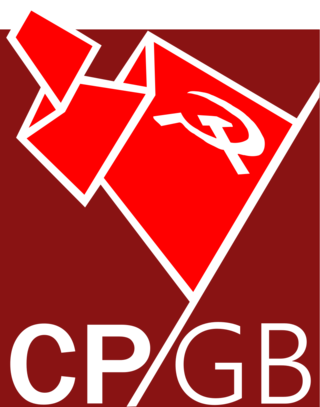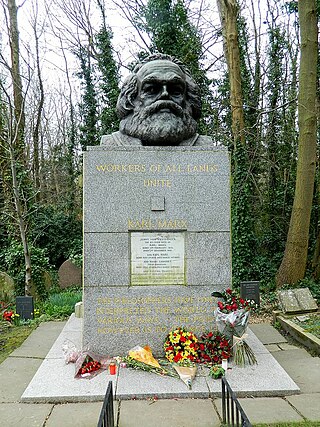Related Research Articles

Trotskyism is the political ideology and branch of Marxism developed by Russian revolutionary and intellectual Leon Trotsky along with some other members of the Left Opposition and the Fourth International. Trotsky described himself as an orthodox Marxist, a revolutionary Marxist, and a Bolshevik–Leninist as well as a follower of Karl Marx, Frederick Engels, Vladimir Lenin, Karl Liebknecht, and Rosa Luxemburg. His relations with Lenin have been a source of intense historical debate. However, on balance, scholarly opinion among a range of prominent historians and political scientists such as E.H. Carr, Isaac Deutscher, Moshe Lewin, Ronald Suny, Richard B. Day and W. Bruce Lincoln was that Lenin’s desired “heir” would have been a collective responsibility in which Trotsky was placed in "an important role and within which Stalin would be dramatically demoted ".

The Fourth International (FI) was a political international established in France in 1938 by Leon Trotsky and his supporters, having been expelled from the Soviet Union and the Communist International.

The Communist Party of Great Britain is a political group which publishes the Weekly Worker newspaper. The CPGB (PCC) claims to have "an internationalist duty to uphold the principle, 'One state, one party'. To the extent that the European Union becomes a state then that necessitates EU-wide trade unions and a Communist Party of the EU". In addition, it is in favour of the unification of the entire working class under a new Communist International. It is not to be confused with the former Communist Party of Great Britain, the Communist Party of Great Britain (Marxist–Leninist), or the current Communist Party of Britain.

Socialism in New Zealand had little traction in early colonial New Zealand but developed as a political movement around the beginning of the 20th century. Much of socialism's early growth was found in the labour movement.
The British and Irish Communist Organisation (B&ICO) was a small group based in London, Belfast, Cork, and Dublin. Its leader was Brendan Clifford. The group produced a number of pamphlets and regular publications, including The Irish Communist and Workers Weekly in Belfast. Τhe group currently expresses itself through Athol Books with its premier publication being the Irish Political Review. The group also continues to publish Church & State, Irish Foreign Affairs, Labour Affairs and Problems.
The League for a Workers' Republic (LWR) was a Trotskyist organisation in Ireland.
Committee to Defeat Revisionism, for Communist Unity was a small British Marxist–Leninist group that left the Communist Party of Great Britain in 1963. CDRCU was led by Michael McCreery, the son of General Sir Richard McCreery. CDRCU was sympathetic towards the Chinese Communist Party and the Party of Labour of Albania, with CDRCU members attending May Day celebrations in Tirana in May 1964. The group began publishing Vanguard in 1963.

Revolutionary Marxist Group was a Trotskyist organisation in Ireland during the 1970s.
This article gives an overview of socialism in the Netherlands, including communism and social democracy. It is limited to communist, socialist, social democratic, and democratic socialist parties with substantial support, mainly proved by having had a representation in parliament. The sign ⇒ means a reference to another party in that scheme.

The Spartacist League/U.S. is a Trotskyist political grouping which is the United States section of the International Communist League, formerly the International Spartacist Tendency. This Spartacist League named themselves after the original Spartacus League of Weimar Republic in Germany, but has no formal descent from it. The League self-identifies as a "revolutionary communist" organization.
Centrist Marxism represents a position between revolution and reformism. Within the Marxist movement, centrism thus entails a specific meaning between the left-wing revolutionary socialism and the right-wing reformist socialist. For instance, the Independent Social Democratic Party of Germany (USPD) and the British Independent Labour Party (ILP) were both seen as centrist because they oscillated between advocating reaching a socialist economy through reforms and advocating a socialist revolution. The parties that belonged to the Two-and-a-half and Three-and-a-half Internationals, who could not choose between the reformism of the Second International and the revolutionary politics of the Third International, were also exemplary of centrism in this sense. They included the Spanish Workers' Party of Marxist Unification (POUM), the Independent Labour Party (ILP), and Poale Zion.
The International Committee of the Fourth International (ICFI) is a public faction of the Fourth International founded in 1953. Today, two Trotskyist internationals claim to be the continuations of the ICFI; one with sections named Socialist Equality Party which publishes the World Socialist Web Site, and another linked to the Workers Revolutionary Party in the UK.

The Communist Party of Britain (Marxist–Leninist), often abbreviated as CPB-ML, is a British Marxist–Leninist political party. It originated in 1968 as an anti-revisionist split from the Communist Party of Great Britain and was chaired by Reg Birch until 1985. The official programme of the party since 1972 has been The British Working Class and its Party. The publication of the CPB-ML was originally known as The Worker, but is today called Workers.

Far-left politics in the United Kingdom have existed since at least the 1840s, with the formation of various organisations following ideologies such as Marxism, revolutionary socialism, communism, anarchism and syndicalism.
During the 1970s in Hong Kong, university campuses experienced a period of heated political discussion and debate, referred to as the "hot era" of the Hong Kong student protests.
Peter Graham was an Irish republican and Marxist who worked as an electrician.
References
- 1 2 3 See International Trotskyism, 1929-1985 by Robert Jackson Alexander, Duke University Press, 1991 (pg. 570).
- 1 2 "In 1965 he [Lawless] set up the Irish Workers Group (IWG), the first Irish Trotskyist group since the 1940s. The IWG was small, but politically formative for a number of people who subsequently played significant roles in the Irish left – in particular, the leaders of People’s Democracy in the North. Maverick socialist whose charm won him friends in unlikely places (Obituary of Gerald Lawless). The Irish Times, 28 January 2012. Retrieved 3 February 2012.
- ↑ Sunday Independent, "Extreme Communists plan branch in Dublin", 9 May 1965 (pgs. 1,6).This article describes the ICG as a London-based Maoist group and states that Gerald Lawless, Angela Clifford, Brendan Clifford, Michael Murphy, Tom O'Leary, Bernard P. Canavan and Liam Eamon Daltun are ICG members.
- ↑ Encyclopedia of British and Irish Political Organizations by Peter Barberis, John McHugh, Mike Tyldesley. Continuum 2005 (pg. 232).
- ↑ Glossary of the Left in Ireland 1960-83